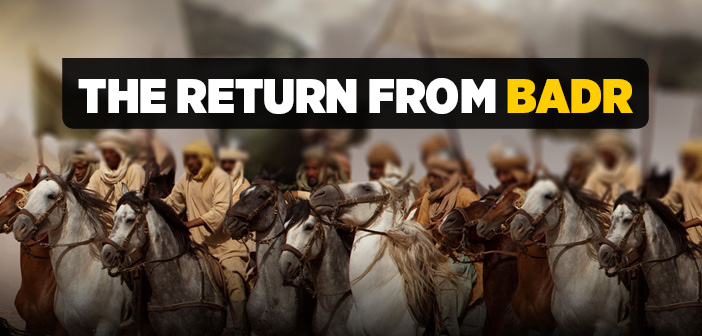What is trickery of war?
The Believers were holding strong with all their power. Nuaym -Allah be well-pleased with him-, a notable of the Ghatafan tribe, who, on the back of the Blessed Prophet’s -upon him blessings and peace- advice ‘War is trickery’ (Bukhari, Jihad, 157; Muslim, Jihad, 17), had kept his acceptance of Islam hidden from the idolaters and managed to put the idolaters and Banu Qurayza on bad terms with one another. An air of hesitation took hold of the coalition of idolaters over having laid siege on Medina. Each tribe suddenly grew suspicious of each other. The Jews ultimately yielded to Nuaym’s persuasive tactics and withdrew to their forts. Now, only the idolaters were left on the field, waiting on the other side of the trenches. Still, the Believers were in a dire situation. Right at the time when the Blessed Prophet -upon him blessings and peace- and the Companions were undergoing a severe trial brought upon by the siege of the idolaters, when hearts had risen up to throats, so to speak, the below ayah was revealed:
“Or do you think that you would enter Paradise while yet the state of those who have passed away before you has not come upon you; distress and affliction befell them and they were shaken violently, so that the Messenger and those who believed with him said: When will the help of Allah come? Now surely the help of Allah is nigh!” (al-Baqara, 214)[1]
Lifting his hands aloft, the Blessed Prophet -upon him blessings and peace- then prayed:
“ O Allah who has sent the Glorious Quran! Allah who is haste to bring the enemy into account! Disperse these tribes of Arabs who have gathered before Medina! O my Lord! Break their unity and shake their resolve so that they cannot hold their ground!” (Bukhari, Maghazi, 29)
The Noble Messenger -upon him blessings and peace- had only finished his prayer when the Divine aid arrived to put a smile of joy on his delightful face. A blistering, harsh storm began gusting through the enemy ranks; a tempestuous gale that left noting ungrounded in its wake, stifling the idolaters with the dust of the Madinan valley, violently blowing their tents away, turning their food pots over and snuffing out their fires. Beleaguered, their camels and horses began fiercely running into each other.[2]
The idolaters, overwhelmed by the force of the gale sent by the Divine, were left struggling in a state of devastation. Even Abu Sufyan, no doubt the most eager among the idolaters, had no other choice than to say to his soldiers:
“I am returning and by the looks of it, so should you!” He mounted his camel and returned to Mecca, without looking back.[3]
Allah, glory unto Him, had sent his aid to the Believers. Thus is declared in the Quran:
“O you who believe! Call to mind the favor of Allah to you when there came down upon you hosts, so We sent against them a strong wind and hosts, that you saw not, and Allah is Seeing what you do.” (al-Ahzab, 9)
“And Allah turned back the unbelievers in their rage; they did not obtain any advantage, and Allah sufficed the believers in fighting; and Allah is Strong, Mighty.” (al-Ahzab, 25)
Taking flight in a dismal and confounded state, the idolaters left behind them many horses, camels, military equipment, foodstuff and belongings, which proved a blessing in disguise for the Believers battling a fierce famine in Medina at the time. Following this enormous victory, the Blessed Prophet -upon him blessings and peace- said to his Companions:
“Now it is your turn! Quraysh will not be able assail you from now on!” (Bukhari, Maghazi, 29)
From that day on, the Believers would no longer be on the defensive, for both the pride and power of the idolaters had suffered an irreparable damage. The hearts of Muslims were now echoing with the promising words of the Blessed Prophet -upon him blessings and peace- :
“It will be us marching on them from now on!”
[1] See, Tabari, Tafsir, II, 464.[2] See, Ibn Saad, II, 71.[3] See, Ibn Hisham, III, 251.
Source: Osman Nuri Topbaş, The Prophet Muhammed Mustafa the Elect II, Erkam Publications





